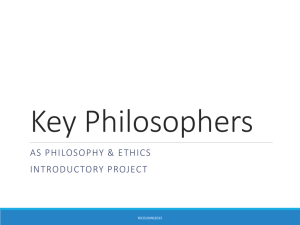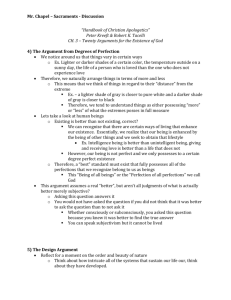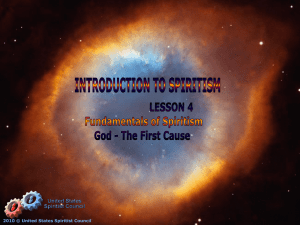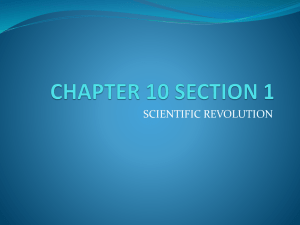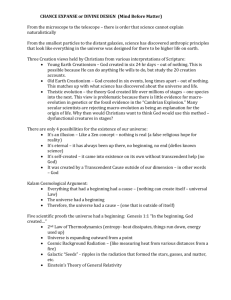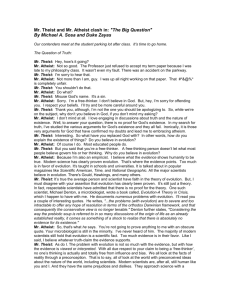dawkins letter
advertisement
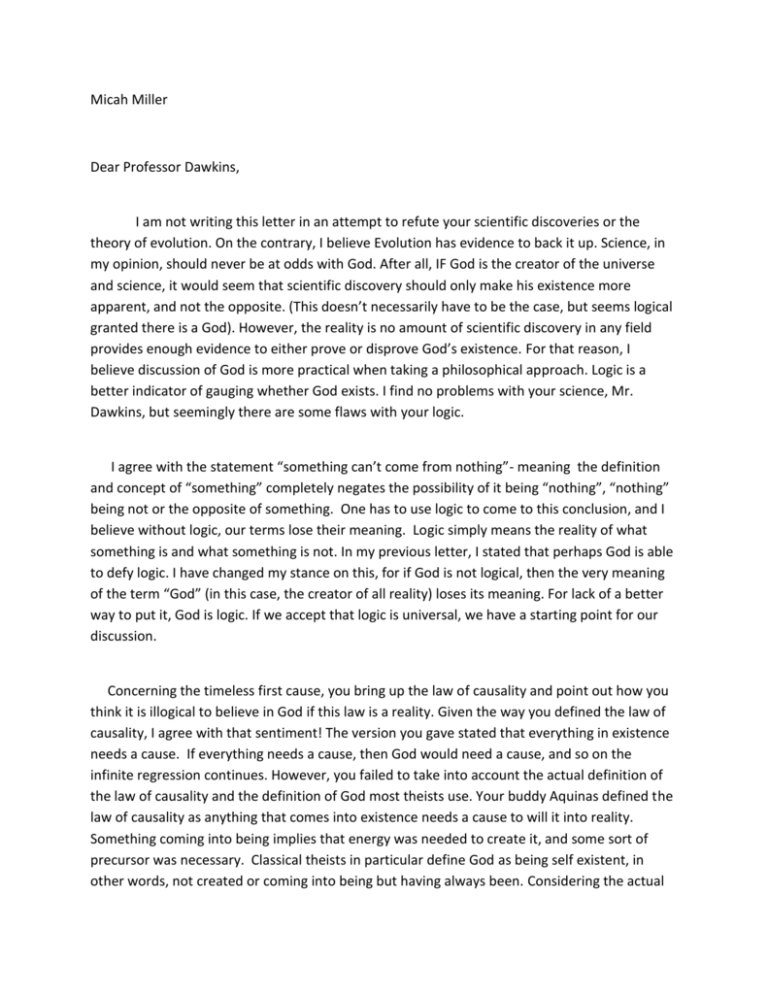
Micah Miller Dear Professor Dawkins, I am not writing this letter in an attempt to refute your scientific discoveries or the theory of evolution. On the contrary, I believe Evolution has evidence to back it up. Science, in my opinion, should never be at odds with God. After all, IF God is the creator of the universe and science, it would seem that scientific discovery should only make his existence more apparent, and not the opposite. (This doesn’t necessarily have to be the case, but seems logical granted there is a God). However, the reality is no amount of scientific discovery in any field provides enough evidence to either prove or disprove God’s existence. For that reason, I believe discussion of God is more practical when taking a philosophical approach. Logic is a better indicator of gauging whether God exists. I find no problems with your science, Mr. Dawkins, but seemingly there are some flaws with your logic. I agree with the statement “something can’t come from nothing”- meaning the definition and concept of “something” completely negates the possibility of it being “nothing”, “nothing” being not or the opposite of something. One has to use logic to come to this conclusion, and I believe without logic, our terms lose their meaning. Logic simply means the reality of what something is and what something is not. In my previous letter, I stated that perhaps God is able to defy logic. I have changed my stance on this, for if God is not logical, then the very meaning of the term “God” (in this case, the creator of all reality) loses its meaning. For lack of a better way to put it, God is logic. If we accept that logic is universal, we have a starting point for our discussion. Concerning the timeless first cause, you bring up the law of causality and point out how you think it is illogical to believe in God if this law is a reality. Given the way you defined the law of causality, I agree with that sentiment! The version you gave stated that everything in existence needs a cause. If everything needs a cause, then God would need a cause, and so on the infinite regression continues. However, you failed to take into account the actual definition of the law of causality and the definition of God most theists use. Your buddy Aquinas defined the law of causality as anything that comes into existence needs a cause to will it into reality. Something coming into being implies that energy was needed to create it, and some sort of precursor was necessary. Classical theists in particular define God as being self existent, in other words, not created or coming into being but having always been. Considering the actual definitions a theist uses, God does not require a first cause. Given the absolute meaning of the terms Aquinas used, I believe his flow is logically sound. Your refutation was also logically sound, but only while using your own definitions of the terms and not the meaning the theist intends. I think you will have to attack this aspect of the theists argument from a different approach, using logic to disprove their point while using their own definitions and terms and not spinning them. The classical theist asserts that it is impossible for the universe to have existed an infinite amount of time prior to our current timeline. In order to get to this point in time, an infinite amount of time would have to be traversed, and thus we would never get here. Besides the problem of traversing an infinite, there is no cause for the infinite existence of the universe, or no explanation for the existence of the infinite. At one point, you related the universe to a chain and insisted that an origin of the chain didn’t need to be explained because every link in the chain could be explained by listing the previous link as a cause. You used this as a response to the theist. Oddly, I find this explanation avoids the true matter at hand. You ignored the fact that the whole reason an infinite chain is unlikely is because there is no origin of the chain. This didn’t even seem like a response to the theist, instead it is more like you just repackaged the problem of a self existent universe in different language and made it sound more plausible. Essentially, you said nothing different from what the theist has proved is impossible from logic. Furthermore, I find it interesting that you think it is OK to theorize the universe has always existed, yet you think it is unlikely God could be self existent. Essentially, whether you choose one or the other (God or the Universe), you endorse a concept you find illogical. To even further alienate yourself, you gave an ultimatum : There was a timeless first cause, The Universe always existed or the Universe came from nothing. Logically speaking, the theist claims he has proved the latter two claims don’t work, thus leaving only one option left. You attempt to disprove the theist and validate a self existent universe by packaging it with the chain analogy, so that instead of an infinitely self existent universe being a paradox, it has a seemingly rational explanation. As I said earlier, this still doesn’t avoid the main problem or answer the question. So, if we go back to the theist’s ultimatum, there is really only one option that seems logically plausible. Unless you can logically prove (not scientifically) that the first cause is impossible, you can’t say the theist is wrong. To fix this problem you made for yourself, you list the singularity (big bang) as a probable first cause. Seemingly, the first cause is the only option we are left with, according to the ultimatum. I personally think whether you choose to accept the singularity or believe in God, you have to acknowledge that either one is self existent, or uncreated. Given what the theist claims about God , it seems that if there was a God, he would be far more capable of being a self existent timeless first cause than a singularity. Though God seems more plausible in my mind, I will admit this doesn’t make one scenario more likely than the other. My main point was when you get to the bottom of it and trace the universe back to its origins, it appears the theist and the atheist say similar things, just using different terms. (Big bang/singularity being synonymous with God in some regards). From, Micah Miller PS: Personally, I don’t think these three choices are the only explanations for reality and the universe. However, at the moment I am unable to think of a different one, especially given your chain analogy does not work.
